
We debunk skincare myths in this comprehensive article, The common misconceptions about them and we provide expert insights to help you achieve healthy and radiant skin. Learn the truth about skincare and say goodbye to myths.
In the relentless pursuit of flawless and radiant skin, myths and misconceptions often lead us astray. I am here to guide you through the labyrinth of skincare myths, offering valuable insights and debunking common misconceptions. This comprehensive article will provide you with the knowledge needed to achieve healthy and glowing skin. Let’s unlock the truths that have long been hidden behind the veil of skincare myths.
Table of Contents
- The Importance of Skin Health
- 60 Common Skincare Myths
- Separating Fact from Fiction
- The Importance of a Consistent Routine
- Understanding Your Skin Type
- Sun Protection Is Non-Negotiable
- Myth-Busting Recap
- Pros and Cons
- Conclusion
- FAQs (Frequently Asked Questions)
- References
- Expert Recommendations
- Access Now: https://shrinke.me/XpBSNN
The Importance of Skin Health
“In the vast landscape of skincare myths, understanding the true importance of skin health becomes a crucial endeavor.”
Your skin is something other than a material for excellence; it’s an impression of your general wellbeing and prosperity. Understanding reality with regards to skincare is pivotal for pursuing informed choices and achieving the best outcomes.
This article aims to unravel 10 common skincare myths that have misled many. By the end, you’ll have a solid foundation of knowledge to foster healthy and radiant skin.
Common Skincare Myths
Myth 1: The Natural vs. Synthetic Skincare Myths
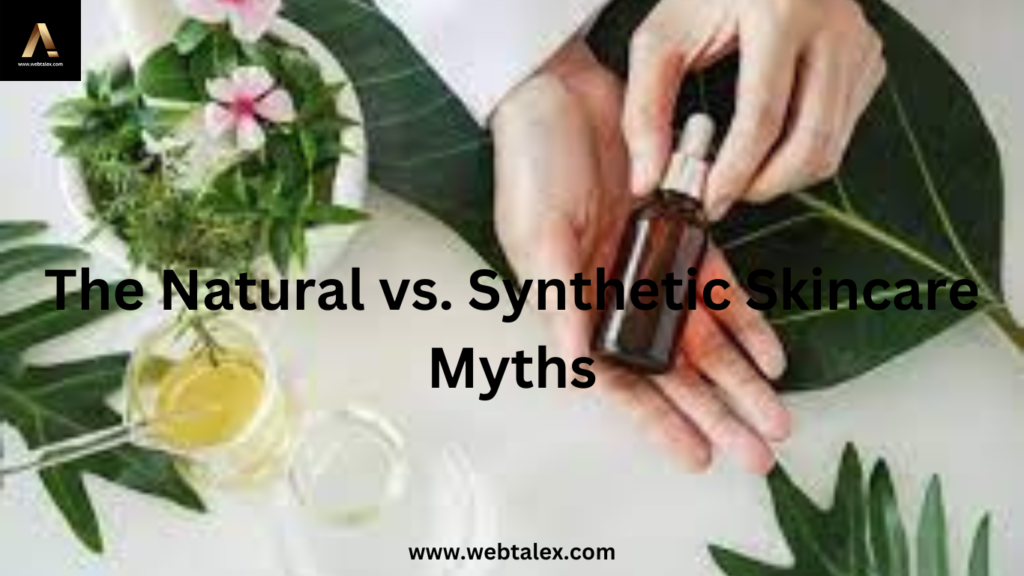
Truth: The well-established banter among regular and manufactured skincare fixings has left numerous purchasers confounded. It’s fundamental to perceive that both normal and engineered parts can offer advantages for your skin. Nonetheless, understanding the subtleties of this discussion can assist you with pursuing more educated decisions in your skincare routine.
Here’s the information, along with whether each myth is true or false:
Myth 2: Organic Products Are Always Safer”: False
While natural skincare items can be advantageous, not all natural fixings are essentially protected. The security of a skincare item depends on the particular fixings it contains and how they are planned. Natural items can, in any case, cause sensitivities or skin responses in certain people.
Myth 3: Chemical-Free Skincare Is Superior” – False
There is no such thing as totally “substance-free” skincare since all skincare items are made out of compound mixtures, whether regular or manufactured. The key is to pick items with fixings that are appropriate for your skin type and concerns. Normal fixings can be valuable, yet engineered ones can likewise be protected and powerful.
Myth 4: All-Natural Ingredients Guarantee Effectiveness – False
Since an item contains all-normal fixings, that doesn’t necessarily mean it’s compelling. The viability of a skincare item relies upon the convergence of dynamic fixings, their similarity with your skin, and the overall detailing. Regular fixings can be powerful, yet so can very well-engineered ones.
Myth 5: Synthetic Skincare Products Are Harmful” – False
Synthetic skincare products can be safe and effective when formulated correctly. Numerous engineered fixings go through thorough testing to guarantee they are okay for use on the skin. It’s fundamental to assess every item based on its particular fixings and the outcomes it offers, as opposed to excusing all manufactured items as unsafe.
Myth 6: Natural Means Non-Irritating skincare”. – False
While regular fixings are for the most part viewed as delicate, they can in any case cause aggravation or sensitivities in certain people. Skin responsiveness changes from one individual to another, and what functions admirably for one may not work for another. It’s vital for fix test items, whether regular or engineered, to guarantee they are reasonable for your skin.
Myth 7: Natural Ingredients Reign Supreme – It’s Complicated
Scientific Evidence: Natural isn’t always better. Efficacy depends on the ingredient and formulation.
Myth 8: All-Natural Products Are Always Safe – False
Scientific Evidence: Natural doesn’t mean risk-free. Some natural ingredients can cause allergies or irritations.
Myth 9: Cucumbers Eliminate Bags Under Your Eyes—Kind of True
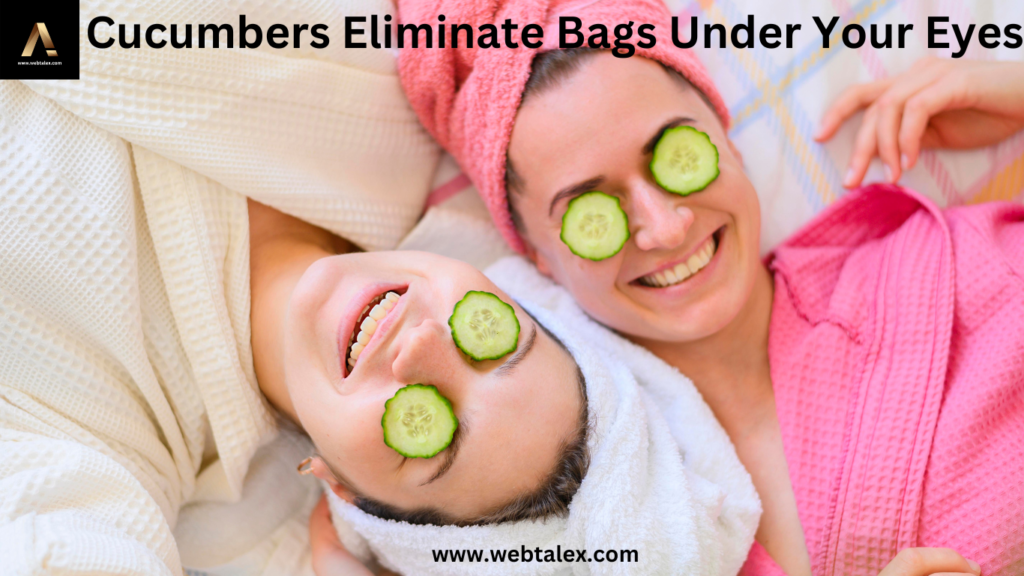
Scientific Evidence: Cucumbers have anti-inflammatory properties that can reduce puffiness, but they won’t work miracles.
Here are some similar myths for “Cucumbers Eliminate Bags Under Your Eyes—Kind of True”:
- “Tea Bags Reduce Under-Eye Puffiness—Partially Effective”
- “Cold Spoons Cure Under-Eye Bags—Somewhat True”
- “Potato Slices Diminish Dark Circles—Partially Accurate”
- “Egg Whites Tighten Under-Eye Skin—Sort of True”
- “Coffee Grounds Reduce Under-Eye Swelling—Partially Effective”
These myths involve various home remedies and their effectiveness in addressing under-eye issues, similar to the cucumber myth.
Myth 10: Face Exercises Will Reduce Wrinkles—False
Scientific Evidence: Facial exercises may not effectively reduce wrinkles. Topical treatments and medical procedures are more reliable.
Here are some similar myths to “Face Exercises Will Reduce Wrinkles—False”:
- “Facial Yoga Erases Fine Lines—Not Really”
- “Chewing Gum Firms Facial muscles—mostly Mostly False”
- “Smiling Prevents Wrinkles—Not Entirely True”
- “Face Workouts for Youthful Skin—Myth Busted”
- “Expression Exercises for Wrinkle-Free Skin—Not Effective”
These myths revolve around the idea of facial exercises and their ability to reduce wrinkles, similar to the myth you mentioned.
Myth 11: Eating Carrots leads to Skin Discoloration—True
Scientific Evidence: Carrots contain beta-carotene, which can cause a harmless orange tint in excessive consumption.
Myth 12: Eating Chocolate Causes Acne Breakouts—Myth Debunked”—False
Scientific Evidence: Scientific studies have not found a direct link between eating chocolate and acne breakouts. Acne is influenced by various factors, including genetics, hormones, and skincare habits.
Myth 13: Fried Foods Lead to Oily Skin and Acne—Fact or Fiction?” – Partially True
Scientific Evidence: While consuming excessive fried foods may not directly cause acne, a diet high in unhealthy fats and processed foods can contribute to skin issues. A balanced diet is essential for overall skin health.
Myth 14: Consuming Dairy Products Aggravates Skin Conditions—Separating Fact from “Fiction”—Partially True
Scientific Evidence: Some individuals with specific dairy sensitivities may experience worsened skin conditions like acne. However, not everyone is affected, and dairy consumption alone is not the sole cause of skin issues.
Myth 15: Sugar Consumption Accelerates Wrinkle Formation—Is It True?” — Partially True
Scientific Evidence: Over-the-top sugar intake can prompt glycation, an interaction that might contribute to untimely skin maturation and wrinkle development. Be that as it may, hereditary qualities, sun openness, and generally way of life likewise assume huge parts in skin maturation.
Myth 16: Spicy Foods Trigger Rosacea Flare-Ups—Exploring the Reality”—True for Some
Spicy foods can indeed trigger rosacea flare-ups in individuals with this skin condition. However, not everyone is sensitive to spicy foods, and triggers can vary among rosacea sufferers.
Common Skin Pore Myths
Myth 17: Pores Are Like Tiny Gates- False
Scientific Evidence: Pores don’t have muscles to open or close. Factors like oil and debris can affect their appearance.
Myth 18: Pores Close with Cold Water-A Common Misconception” – False
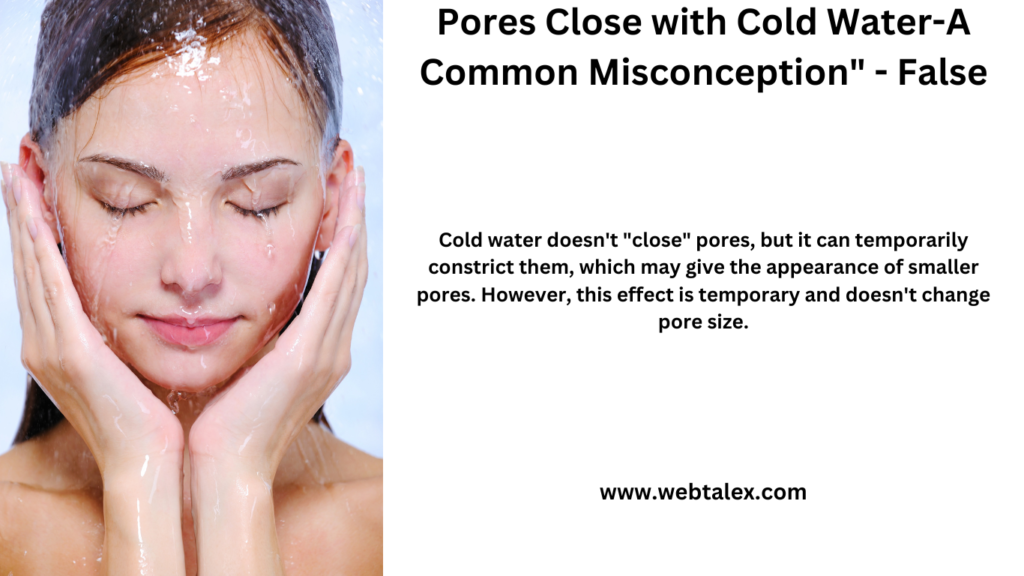
Cold water doesn’t “close” pores, but it can temporarily constrict them, which may give the appearance of smaller pores. However, this effect is temporary and doesn’t change pore size.
Myth 19: Steam Opens Pores for Deep Cleaning–A Widespread “Belief”—Mostly False
While steam can soften debris within pores, it doesn’t physically open or close them. It may help with deep cleaning, but pore size remains unchanged.
Myth 20: Pore Strips Remove All Impurities – A Common Skincare Myth” -Partially True
Pore strips can remove some surface impurities, like blackheads, but they may not address deeper pore congestion. Overuse can also irritate the skin.
Myth 21: Foundation Clogs Pores – A Widely Held Misbelief” – Partially True
Heavy or non-comedogenic foundation may not clog pores, but some formulations can. It’s essential to choose suitable makeup products for your skin.
Myth 22: Large Pores Are Irreversible – A Pervasive Misconception” – False
While you can’t change your pore size permanently, skincare and cosmetic procedures can help minimize the appearance of large pores.
Myth 23: Makeup Always Clogs Pores and Causes Acne – False
While some makeup products can contribute to acne, not all cosmetics have this effect. Non-comedogenic or oil-free options are less likely to clog pores.
Myth 24: Pore Size Can Be Altered – False
Scientific Evidence: Pores are not doors that can be closed. You can minimize their appearance with proper skincare, but you can’t change their size. Cleansing, exfoliating, and using non-comedogenic products can help. Pore size is largely genetic. Minimize their appearance with proper care, not miraculous changes.
Myth 25: Pores Expand with Age – False
Scientific Evidence: Pore size remains largely genetic. Aging can affect skin elasticity but doesn’t directly enlarge pores.
Myth 26: Steam Opens Pores – False
Scientific Evidence: Steam can temporarily soften debris in pores, but it doesn’t ‘open’ or ‘close’ them.
Myth 27: Tanned Skin Is Healthy – False
Scientific Evidence: The allure of bronzed skin often conceals a darker truth. Tanning is a sign of skin damage inflicted by the sun’s harmful UV rays. Welcome to the sun-kissed journey of debunking this myth.
Myth 28: A Tan Offers Natural Sunscreen Protection – False
Scientific Evidence: A tan provides minimal sun protection, equivalent to wearing a low SPF sunscreen. It doesn’t replace the need for proper sun protection.
Myth 29: Sunburn Always Precedes a Tan – Partially True
Scientific Evidence: Sunburn can occur before tanning, but not everyone tans after sunburn. Tanning is a skin response to UV exposure, but it doesn’t undo sunburn damage.
Myth 30: Indoor Tanning Is Safer Than Sunbathing – False
Scientific Evidence: Indoor tanning exposes skin to harmful UV rays, increasing the risk of skin cancer and premature aging. It’s not a safe alternative to natural sun exposure.
Myth 31: Dark Skin Is Immune to Sun Damage – False
Scientific Evidence: People with darker skin tones have more natural protection against UV rays, but they are not immune to sun damage or skin cancer. Sun protection is essential for all skin types.
Common Skincare products Myths
Myth 32: Premium Products Are Always Superior – False
Scientific Evidence: Price doesn’t necessarily correlate with product quality. Ingredients and formulation matter more. Price doesn’t always equate to quality in skincare. Many affordable products deliver excellent results.
Myth 33: Luxury Brands Use Better Ingredients – Not Always True
Scientific Evidence: While luxury brands may use high-quality ingredients, it doesn’t guarantee superior results. Efficacy depends on the formulation and compatibility with your skin.
Myth 34: Premium Products Are Safer for the Skin – Not Necessarily
Scientific Evidence: Safety depends on ingredient choice and formulation rather than price. Both premium and affordable products can be safe when used correctly.
Myth 35: Premium Skincare Is Suitable for All Skin Types – False
Scientific Evidence: Premium products may not cater to specific skin concerns or types. It’s essential to choose products based on your skin’s unique needs.
Myth 36: High-End Packaging Indicates Quality – False
Scientific Evidence: Attractive packaging doesn’t guarantee product effectiveness. Focus on the ingredients and formulation rather than the packaging
Myth 37: Expensive Serums Are Always Superior – False
Myth 38: Expensive Skincare Guarantees Results – False
Scientific Evidence: The price of skincare products doesn’t always reflect their effectiveness. Look for key ingredients instead.
Myth 39: Only Expensive Brands Are Trustworthy – False
Scientific Evidence: Affordable brands can offer effective products. Research ingredients and read reviews.
Myth 40: Daily Exfoliation Equals Glorious Skin – False
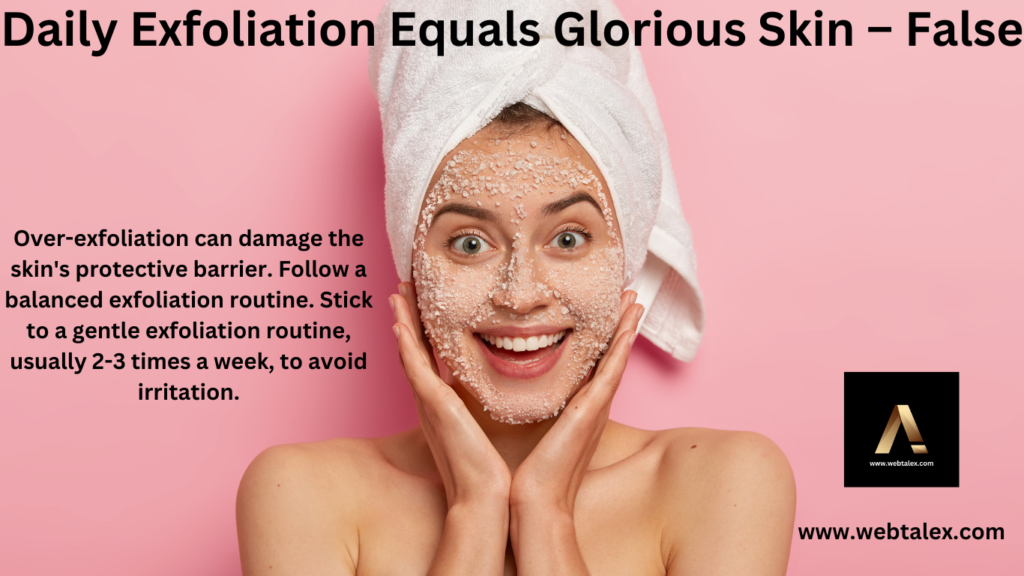
Scientific Evidence: Over-exfoliation can damage the skin’s protective barrier. Follow a balanced exfoliation routine. Stick to a gentle exfoliation routine, usually 2-3 times a week, to avoid irritation.
Myth 41: Scrub Harder for Purer Skin – False
Scientific Evidence: Aggressive scrubbing can damage the skin. Gently exfoliate for better results.
Myth 42: The More You Exfoliate, the Better – False
Scientific Evidence: Excessive exfoliation can damage the skin’s protective barrier. Follow a recommended schedule.
Myth: Sensitive Skin Shouldn’t Be Exfoliated – Mostly Not True
Exfoliation can be beneficial for sensitive skin as it unclogs pores and improves moisture absorption. Just remember to use a gentle product and technique to avoid irritation or inflammation.”
- Harsh Scrubs Provide the Best Exfoliation – False
- Exfoliating Can “Detoxify” the Skin – False
- Exfoliating Twice a Day Is Better – False
- All Exfoliants Are Equal – False
- Exfoliating Removes Wrinkles – False
These myths address common misconceptions about exfoliation and its effects on the skin, emphasizing the importance of a balanced exfoliation routine.
Common Skin Acne Myths
Myth 43: Toothpaste Clears Acne – Partially True, But Not Recommended
Scientific Evidence: Acne can affect people of all ages. Hormonal fluctuations, diet, and genetics play a significant role.
Myth 44: Makeup Sparks the Acne Blaze – False
Scientific Evidence: Makeup itself isn’t a primary cause of acne. Ensure clean brushes and avoid pore-clogging products.
Myth 45: Eating Chocolate Causes Acne Breakouts—Myth Debunked”—False
Myth 46: Pimple Popping Fast-Tracks Healing – False
Scientific Evidence: Popping pimples can lead to scarring and infection. Opt for gentler treatments.
Myth 47: Wearing Makeup Daily Leads to Breakouts – False
Scientific Evidence: Consistently wearing makeup does not necessarily cause acne. Proper makeup removal and skincare routines are essential to prevent breakouts.
Myth 48: High-End Makeup Is Less Likely to Cause Acne – Not Always True
Scientific Evidence: The price of makeup doesn’t always correlate with its impact on acne. Ingredients and formulation matter more than the brand.
Myth 49: Makeup Brushes Harbor Bacteria and Cause Acne – Partially True
Scientific Evidence: Makeup brushes can collect bacteria if not cleaned regularly, which may contribute to acne. Proper brush hygiene is important.
Myth 50: Acne-Prone Skin Should Avoid Makeup Altogether – False
Scientific Evidence: Acne-prone individuals can use makeup as long as they choose suitable products and maintain good skincare practices.
Myth 51: All Acne Is Born Equal – False
Scientific Evidence: Acne varies in type and causes. Tailor your treatment to your specific condition.
Myth 52: Greasy Food, the Acne Culprit – False
Scientific Evidence: Diet’s impact on acne is complex. Focus on a balanced diet rather than singling out specific foods.
Myth 53: Natural Oils Don’t Cause Breakouts – False
Scientific Evidence: Some natural oils can clog pores and lead to breakouts. Check the comedogenic rating of oils.
Myth 54: Acne Is Only on the Face – False
Scientific Evidence: Acne can appear on the face, back, chest, and other body parts. Treat accordingly.
Myth 55: Makeup Is a Primary Acne Cause – False
Scientific Evidence: While makeup can contribute to acne, it’s not the sole cause. Use non-comedogenic products.
Common Sunscreen or Sunblock Myths
Myth 56: Natural Sunscreens Are Always Safe – False
Scientific Evidence: Some natural sunscreens may lack broad-spectrum protection. Choose well-tested options.
Myth 57: Cloudy Skies Grant Immunity from the Sun’s Gaze – False
Scientific Evidence: Clouds don’t provide adequate protection from harmful UV rays. Sunscreen is a daily essential to shield your skin from premature aging, sunburn, and the risk of skin cancer. UV rays penetrate clouds. Wear sunscreen even on overcast days.
Myth 58: Sunscreen Is Reserved for Sunny Days – False
Scientific Evidence: UV rays are present even on cloudy days. Wear sunscreen daily for skin protection.
Myth 59: Sunscreen Is Only for Sunny Days – False
Scientific Evidence: UV rays are present year-round. Protect your skin even on cloudy or winter days.
Myth 60: Sunscreen at Night Prevents Aging – False
Scientific Evidence: Sunscreen is designed for daytime use. Nighttime skincare focuses on repair and hydration.
Myth: DIY Sunscreen Is Safe – False
Scientific Evidence: Homemade sunscreens lack stability and proper protection. Use commercial products with proven SPF ratings.
Some More Common Myths
Myth: Face Masks Hold the Elixir of Youth – False
Scientific Evidence: While masks offer benefits, they can’t replace a holistic anti-aging routine.
Myth: Men Don’t Require Moisturization – Incorrect
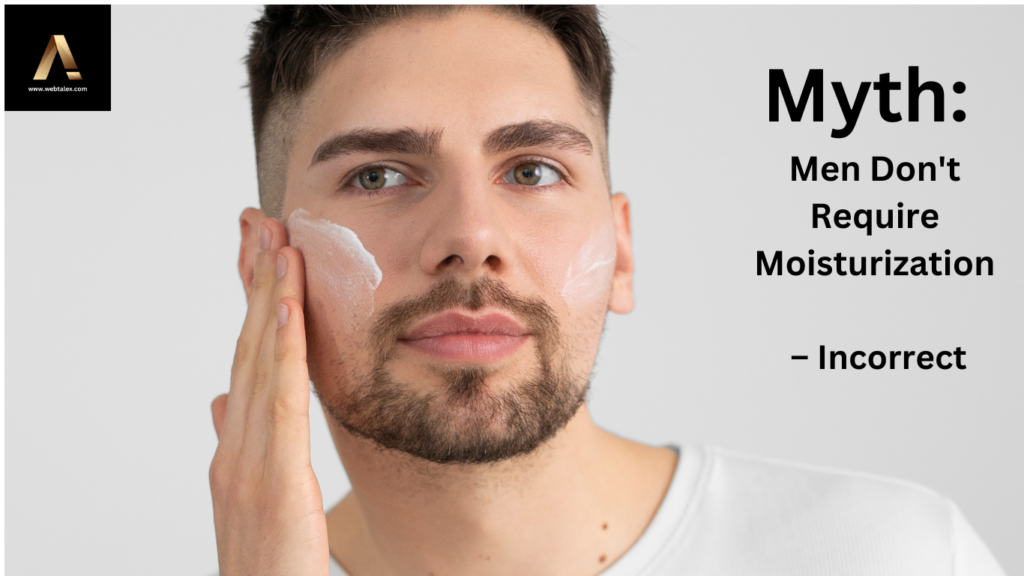
Myth: Skin Becomes Immune to Products – False
Scientific Evidence: Your skin doesn’t build immunity to products. Rotate as needed for best results.
Myth: Toners Are a Skincare Commandment – Not Always
Scientific Evidence: Toners serve specific purposes. Use them if they align with your skincare goals.
Myth: Topical Collagen Prevents Wrinkles – False
Scientific Evidence: Collagen in skincare doesn’t replace lost collagen in the skin. It’s often too large to penetrate deeply.
Myth: Anti-Aging Products Rewrite Wrinkles – Partially True
Scientific Evidence: Anti-aging products can improve skin texture but won’t eliminate wrinkles entirely.
Myth: Antioxidants Erase Wrinkles – Not Supported by Science – False
Scientific Evidence: Cell reinforcements are a phenomenal device for battling the impacts of maturing. While they in all actuality do help forestall skin harm and battle irritation, they don’t really eliminate kinks or converse the signs of maturing.
Myth: Exfoliation Can Erase Wrinkles – False
Scientific Evidence: While exfoliation can improve skin texture, it won’t eliminate deep wrinkles.
Myth: Drinking Water Hydrates Your Skin – Partially True
Scientific Evidence: While staying hydrated is essential, water alone won’t solve dry skin issues. Use moisturizers for external hydration.
Myth: More Product Means Better Results – False
Scientific Evidence: Using excessive skincare products can overwhelm your skin and lead to irritation. Follow recommended amounts.
Myth: Natural Oils Cure All Skin Woes – False
Scientific Evidence: While some natural oils offer benefits, they may not address all skin issues. Seek targeted solutions.
Myth: Skin Should Feel Tight After Cleansing – False
Scientific Evidence: Tightness indicates over-cleansing, which can damage the skin’s barrier. Choose a mild cleanser.
Myth: Blackheads Are Caused by Dirt – False
Scientific Evidence: Blackheads result from excess oil and dead skin cells, not dirt. Cleansing alone won’t eliminate them.
Myth: Your Skin Can ‘Breathe’ – False
Scientific Evidence: Skin doesn’t breathe like lungs. It absorbs and releases moisture but doesn’t need to ‘breathe’ without products.
Myth: Allergic Reactions Happen Immediately – False
Scientific Evidence: Allergies can develop over time. Patch-test new products to avoid delayed reactions.
Myth: Age Determines Your Skincare Needs – False
Scientific Evidence: Skincare needs depend on skin type, concerns, and lifestyle, not just age.
Myth: Moisturizer Is Optional for Oily Skin – False
Scientific Evidence: Even oily skin benefits from hydration. Use oil-free moisturizers to maintain balance.
Myth: Oily Skin Thrives Without Moisturizer – False
Scientific Evidence: Even oily skin needs hydration to maintain balance. Use oil-free moisturizers.
Myth: More Expensive Means More Effective – False
Scientific Evidence: Price doesn’t guarantee product effectiveness. Look for ingredients proven to work.
Myth: Hypoallergenic Products Are Always Safe – False
Scientific Evidence: ‘Hypoallergenic’ doesn’t guarantee no allergic reactions. Patch-test new products, especially if you have sensitive skin.
Myth: You Should Feel Immediate Effects – False
Scientific Evidence: Skincare often takes time to show results. Be patient and consistent with your routine.
Myth: Shaving Darkens Hair – False
Scientific Evidence: Shaving doesn’t alter hair color or thickness. It may appear darker as it regrows.
Myth: All Acids Are Harsh – False
Scientific Evidence: Not all acids are abrasive. Hyaluronic acid, for instance, hydrates without irritation.
Myth: Products Must Tingle to Work – False
Scientific Evidence: Tingling doesn’t indicate effectiveness. Some products are designed to minimize irritation.
Myth: You Can ‘Detox’ Your Skin – False
Scientific Evidence: Skin doesn’t need detoxification. Skincare helps maintain its natural balance.
Myth: Overnight Miracles Are a Reality – False
Scientific Evidence: Transforming your skin takes time and consistent care. Be patient and persistent.
Myth: Skincare Knows No Gender – True
Scientific Evidence: Skincare is essential for everyone, regardless of gender. Skin health is universal.
Myth: Your Skin Type Never Changes – False
Scientific Evidence: Skin type can change due to factors like age, climate, and hormonal shifts. Adjust your routine as needed.
Myth : Warts Don’t Spread – False
Scientific Evidence: Hot water can strip your skin of its natural oils, leading to dryness and irritation. Stick to lukewarm water for a gentler cleanse.
Myth: Sweating Eliminates Toxins – Incorrect
Scientific Evidence: Sweating primarily helps regulate body temperature by dissipating heat. It does not play a significant role in detoxifying the body.
Separating Fact from Fiction
Now that we’ve debunked common skincare myths, let’s focus on evidence-based practices that will help you achieve your skincare goals.
The Importance of a Consistent Routine
Fact: Consistency is the cornerstone of effective skincare. Establish a daily routine that includes cleansing, moisturizing, sunscreen application, and any targeted treatments as needed.
Understanding Your Skin Type
Fact: Identifying your skin type (dry, oily, combination, or sensitive) is fundamental to selecting the right products. Consider consulting a dermatologist for a professional assessment and personalized recommendations.
Sun Protection Is Non-Negotiable
Fact: UV radiation poses a significant threat to your skin, contributing to premature aging and increasing the risk of skin cancer. Always apply broad-spectrum sunscreen with at least SPF 30, regardless of weather conditions.
Myth-Busting Recap
In this article, we’ve uncovered common skincare myths and emphasized the importance of evidence-based practices for achieving and maintaining healthy skin. Remember that skincare is not one-size-fits-all; what works for one person may not work for another. Seeking professional guidance when needed is crucial to your skincare journey.
Expert Recommendations
Now that we’ve dismantled these 60 skincare myths, it’s crucial to build a strong foundation for your skincare routine. Here are expert recommendations:
- Know Your Skin Type: Understand your skin’s unique characteristics to choose the right products.
- Patch Test: Always patch-test new products to check for allergies or sensitivities.
- Balanced Diet: Focus on a balanced diet rather than singling out specific foods as acne triggers.
- Sunscreen Daily: Wear sunscreen daily, regardless of the weather, to protect against UV damage.
- Consistency Is Key: Be patient and consistent with your skincare routine. Results take time.
- Read Ingredients: Look for ingredients that address your specific concerns rather than relying on price or branding.
- Adjust with Time: Adapt your skincare routine as your skin’s needs change due to various factors.
- Gentle Care: Avoid aggressive scrubbing, over-exfoliation, or harsh products that can harm your skin.
- Non-Comedogenic Makeup: Choose makeup labeled as non-comedogenic to prevent pore-clogging.
- Consult a Dermatologist: If you have persistent skin issues or concerns, consult a dermatologist for personalized guidance.
Conclusion
Skincare is a science, and it’s essential to base your routine on evidence rather than myths. With these 60 myths debunked and expert recommendations in mind, you’re equipped to make informed choices for healthier, more radiant skin.
Remember, skincare is not one-size-fits-all. Tailor your routine to your unique skin type, concerns, and goals. Stay consistent, be patient, and let the power of science guide your path to skincare success.
References:
By following these expert recommendations and integrating them into your skincare routine, you’ll be better equipped to achieve the healthy, glowing skin you desire. Remember, consistency, patience, and informed choices are the keys to unlocking your skin’s true potential.
FAQs (Frequently Asked Questions)
- Do natural ingredients guarantee better skincare results?
- Natural ingredients can be beneficial, but not all synthetic ingredients are harmful. Product formulation and suitability for your skin type matter most.
- Can pores be permanently shrunk?
- Pore size is largely determined by genetics. While you can’t permanently shrink pores, proper skincare practices can minimize their appearance.
- Is expensive skincare always better than affordable options?
- Price doesn’t always reflect product quality. Many affordable skincare products are effective, provided they are suitable for your skin type.
- Is it necessary to exfoliate daily for smooth skin?
- Over-exfoliating can harm your skin. Stick to a gentle exfoliation routine, typically 2-3 times a week, to avoid irritation.
- Does makeup cause acne?
- Makeup itself doesn’t cause acne, but using expired or low-quality products can contribute to clogged pores. Ensure your makeup and tools are clean.
- Is skincare exclusive to women?
- Skincare is essential for everyone, regardless of gender. Proper skincare practices benefit both men and women.
References
- American Academy of Dermatology. (2023). Skincare on a budget. https://www.aad.org/public/everyday-care/skin-care-basics/care/skin-care-budget
- Mayo Clinic. (2023). Acne treatments: Medical procedures may help clear skin. https://www.mayoclinic.org/diseases-conditions/acne/diagnosis-treatment/drc-20368048
- Skin Cancer Foundation. (2023). Sunscreen FAQ. https://www.skincancer.org/skin-cancer-prevention/sun-protection/sunscreen/
- WebMD. (2023). What is the best way to cleanse my face? https://www.webmd.com/beauty/cleansing-your-face
Related Article:
- Achieve Radiant Skin in 7 Days – webtalex.com on Glowing Skin Mastery 2023: 10 Secrets for Radiance!
- Achieve Radiant Skin in 7 Days – webtalex.com on “Best Healthy Hair Strategies for Lustrous Locks 2023-2024”
- Achieve Radiant Skin in 7 Days – webtalex.com on Revolutionize Your Skincare Routine: The Ultimate 360-Degree Guide
- Achieve Radiant Skin in 7 Days – webtalex.com on The Ultimate Beauty Hacks: A Complete Guide to Radiant Transformation 2023
- Achieve Radiant Skin in 7 Days – webtalex.com on How to Embrace the Fountain of Youth: 7 Secrets to Timeless Wellness

As the dedicated voice of Webtalex.com, I’m committed to delivering the latest and most inspiring content in beauty and health. I aim to keep you informed on the newest trends and holistic wellness, helping you look and feel your best. Join me for insightful beauty techniques, wellness tips, and much more to enrich your lifestyle.


I seriously love your site.. Pleasant colors & theme.
Did you make this web site yourself? Please reply back as I’m looking to
create my own website and would love to know where you got
this from or exactly what the theme is named. Cheers!
Thank you for your kind words. Yes, I made it myself.
Best Regards
Petty nice post. I just stumbled upon your blog and wanted to
say that I’ve truly enjoyed surfing around your blog posts.
In any case I’ll bee subscribing tto yor rss feed and I hope you writte again very soon! https://Www.Waste-Ndc.pro/community/profile/tressa79906983/
Pretty nice post. I just stumbled upon your blog and wanted tto say that I’ve trully enjoyed surfing around your blog posts.
In any case I’ll be subscribing to your rss feed and I hope you write again very soon! https://Www.Waste-Ndc.pro/community/profile/tressa79906983/
Thank you so much for your kind words! I’m thrilled to hear that you enjoyed my blog posts. Your support means a lot to me. I look forward to sharing more content with you soon. Happy reading!